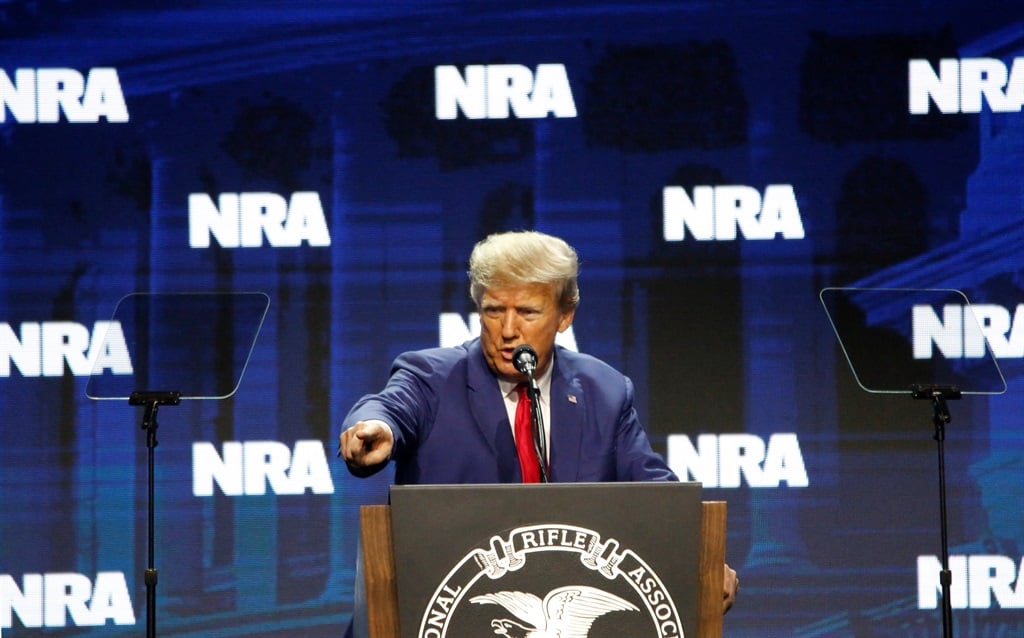
Donald Trump speaks during the 152nd National Rifle Association (NRA) annual convention in April 2023. (Alex WROBLEWSKI / AFP)
- Donald Trump was shot, but still intends to protect gun rights in the US, a top advisor says.
- He has promised to appoint judges who will prevent firearm limits from being imposed.
- Republicans in general seem not to have been swayed by the attack, and continue to be pro-gun.
Donald Trump will safeguard gun rights by appointing federal judges who oppose new firearm limits if he is elected in November, despite narrowly surviving an assassination attempt, a senior adviser to his presidential campaign said on Tuesday.
“We’ll see a continuation of supporting and defending the Second Amendment, and really where that comes into play is, you know, the judiciary,” Chris LaCivita said at an event hosted by the US Concealed Carry Association, a gun rights group, at the Republican National Convention in Milwaukee.
The US Constitution’s Second Amendment guarantees the right to bear arms.
The remarks from LaCivita – who said he carries a concealed weapon himself when not with Trump – dovetailed with the sentiments expressed by a dozen Republican Party delegates interviewed by Reuters at the convention, days after a would-be assassin’s bullet grazed Trump’s ear at a Saturday rally in Pennsylvania.
All were adamantly against any reform to America’s gun laws, including raising the legal age to buy a gun, strengthening background checks or limiting assault-style rifles similar to the one the gunman used in his attack.
Instead, the delegates said any changes should focus on funding better mental health support for troubled citizens, a standard Republican position. They blamed mass shootings and other gun violence – including the assassination attempt on Trump – largely on mental illness and weapons falling into the wrong hands.
US law enforcement officials are still trying to determine why Thomas Matthew Crooks, a 20-year-old nursing home aide, tried to kill Trump. Crooks was shot dead in the attack.
“It’s all about mental health,” said Will Boone, a delegate from Montana. “The right to have a gun is enshrined in the Constitution. Once you start infringing on that, you’ll start other rights being taken away.”
Steve Kramer, from Georgia, said it was a “lie” that expanded background checks would help.
“If you look at most of the killings, someone stole the gun, so background checks wouldn’t matter,” Kramer said.
Between 1966 and 2019, apart from school shooters who mainly stole their weapons from family members, most people who committed mass shootings had bought their weapons legally, according to data compiled by the National Institute of Justice, a research agency of the Department of Justice.
The weapon used by Trump’s would-be assassin was owned by his father, according to investigators.
The Republican Party has generally blocked attempts to reform gun laws, even after the massacre of 20 elementary school children in Connecticut in 2012 by a gunman armed with an AR-15 assault-type weapon and two handguns.
Efforts to pass universal background checks and an assault weapons ban were defeated by Republicans in the US Senate after that school massacre.
During his 2017 to 2021 term, Trump tried several times to loosen gun laws, said Kris Brown, president of Brady: United Against Gun Violence, an advocacy group.
Shortly after taking office, Trump signed into law a bill that reversed an Obama-era regulation that made it harder for people with mental illness to purchase guns.
The Trump administration did ban bump stocks, an accessory that essentially converts a semi-automatic weapon into a machine gun. A bump stock was used in the Las Vegas massacre of 2017, when a gunman killed 60 and wounded more than 400 people in the deadliest mass shooting in modern US history.
In June, the conservative-leaning US Supreme Court lifted the ban on bump stocks, citing the Second Amendment.
In 2022, President Joe Biden signed the first major gun safety bill in decades, which blocked gun sales to those convicted of domestic violence and gave new funding to state “red flag” programs to remove guns from people deemed dangerous. The legislation passed Congress in the wake of a 2022 school shooting in Uvalde, Texas, that killed 19 young children and two teachers.
In 2021, the most recent year for which gun death data is available, nearly 49 000 people in the US died from gun-related injuries, according to the Centers for Disease Control and Prevention. That included a record number of gun suicides and murders.
In February, speaking to the National Rifle Association, Trump pledged to undo all gun-related restrictions enacted by Biden, whom he faces in the 5 November election.
